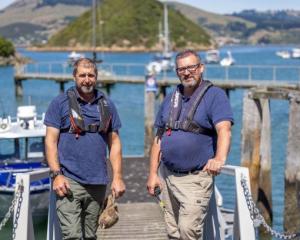The Otago Regional Council's spat with the New Zealand Transport Agency is concerning - particularly if it comes at a cost to ratepayers.
The NZTA has taken issue both with the council's regional public transport plan and its decision to award new three-year contracts for Dunedin's public bus services despite the agency's
direction to roll over existing contracts until new legislation is implemented. The agency had threatened not to subsidise the bus services if the council went ahead with the contracts.
At face value, the ORC's actions seem understandable.
Chief executive Peter Bodeker says the council's six-year regional public transport plan - adopted last year - includes higher standards for public buses than those imposed nationally. The standards relate to the age of buses and emissions.
The council said tenders were allocated because it believed the new legislation would take at least two years to be implemented and contracts would then be close to renewal. It also said by making services more efficient and shorter term, it could save about $1 million over the three years.
Mr Bodeker said ratepayers would not be directly affected if the NZTA did enact its threat to pull its subsidy as ''contingency funds'' could be used.
However, these funds - about $4 million allocated for Dunedin transport - have, of course, already come from ratepayers' pockets through the years, and ratepayers could lose out if they are no longer available for future requirements.
In addition, the Government subsidy - effectively worth about $1.5 million over three years - is clearly worth more than the savings made by the ORC.
Of additional concern is that the new legislation could render the contracts illegal. That could result in penalties being paid and further possible losses to ratepayers. The NZTA is adamant the council's decisions are flawed, with Southern regional director Jim Harland saying the contracts would not deliver the best services for passengers - or the best value for money over the medium or long term. However, an ORC-commissioned independent report has cleared the council of any wrongdoing in its handling of the bus contracts.
While both organisations claim to have the best interests of ratepayers at heart, it certainly seems as though they are being used as a political football at the moment. It is to be hoped they will not ultimately end up paying the price if the two organisations cannot find a solution.
Life on the fringe
The weird, wacky and wonderful will be centre stage for the next 11 days as part of the Dunedin Fringe Festival. Organisers are billing this year's festival - the 10th - as a ''monster'', featuring 60 events by more than 300 artists from throughout New Zealand and overseas, including 28 world premieres.
The festival's aims are ''to bring innovative contemporary art to a wider audience and to support the work of emerging artists''. Artists are encouraged to push the boundaries - and audiences to ''step outside their comfort zones''.
The festival opens tonight with a family-friendly launch in the Octagon - the festival hub - featuring aerial performers, a container art installation and a night art market. The annual fringe festival is the only one in the South Island, showing how fortunate once again Dunedin is in being able to attract and sustain such an event, which contributes to the city's rich cultural diversity.
The hard work of the Dunedin Fringe Arts Trust, headed by director Paul Smith, is vital in ensuring the smooth running of the event - and also sourcing and securing the diverse and experimental acts that are thought-provoking and challenging as well as entertaining. Mr Smith says the festival has a budget of $300,000, but estimates the festival is ''easily worth a million dollars to the local economy'', bringing ''hundreds of artists and their support crews'' to the city for its duration. It receives major funding from Creative New Zealand, the Dunedin City Council and the Otago Community Trust.
But, as with many other such events, its ongoing success also relies on support from locals - sponsors, volunteers and audiences. All those who can are encouraged to experience life on the fringe. With many free events, there can be no excuses.












